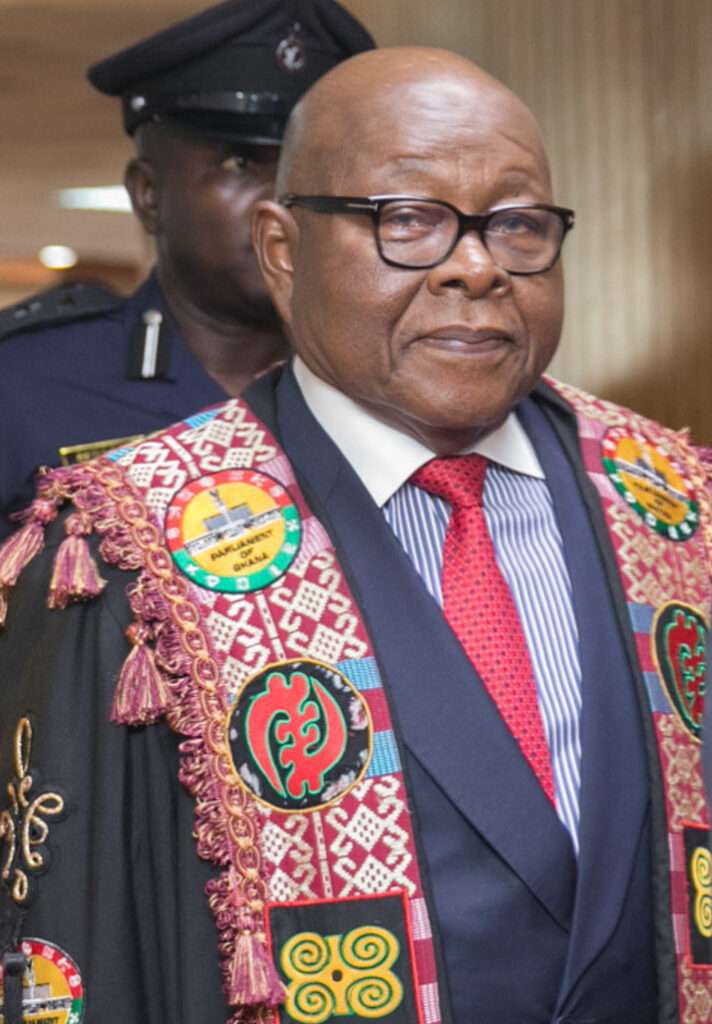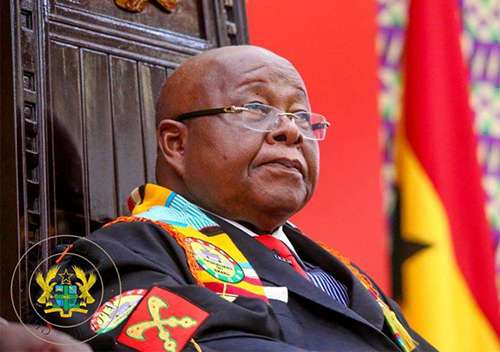The former Speaker of Parliament of Ghana’s Fourth Republic Professor Aaron Mike Ocquaye, has disagreed based on a comprehensive analysis of the legal and procedural intricacies surrounding declaring Vacant the Seats of the 4 Members of Parliament (MP), based on political party alignment.
His remarks focused on the powers of political parties, particularly the New Patriotic Party (NPP), in initiating actions against MPs who deviate from party loyalty.
Prof Mike Ocquaye began by highlighting the crucial role of political parties in determining the fate of their MPs in instances of disloyalty.
“So, it is the NPP that can trigger the removal of this individual from the government. This can only be triggered by the NPP as a political party.”
Professor Aaron Mike Ocquaye Speaker of Parliament of Ghana’s Fourth Republic
According to Prof Mike Ocquaye, MPs are bound to the party they represented during their election.
Therefore, if an MP decides to contest as an independent or shift their allegiance to another party, the political party must initiate the necessary legal steps for their removal.
He argued that individuals outside of the party have no grounds, or locus standi, to initiate such actions. He emphasized; “The benefit is not his. The law does not stand to his inurement. He has no locus.”
The Correct Process for Removing an MP
One of the key themes of the interview was the importance of following proper legal and procedural channels in dealing with MPs who are seen to have violated party rules.
“So, the NPP as a party wrote to the Speaker stating why they were withdrawing their support because, according to their constitution, this person had betrayed his allegiance to the party.”
Professor Aaron Mike Ocquaye Speaker of Parliament of Ghana’s Fourth Republic
He emphasized that this legal provision exists to protect political parties from internal disloyalty and betrayal, adding that it was a mechanism designed to address such “mischiefs” that may arise within a party. Prof Mike Ocquaye’s legal understanding of the situation was clear. He reiterated; “It is to correct a certain mischief that can be operated against political parties.”
Legal Boundaries: No External Influence Allowed

Prof Mike Ocquaye cautioned against external interference in matters that are strictly within the purview of political parties.
He suggested that only the party in question could raise concerns, not outsiders.
“Because he doesn’t belong to the NPP. He doesn’t belong to the party involved. Is it you who should say there’s a problem in my house? You say there’s a problem, I have a problem with my wife, and I’m saying I have no problem with my wife.”
Professor Aaron Mike Ocquaye Speaker of Parliament of Ghana’s Fourth Republic
He explained that political parties often resolve such disputes internally without the need for external involvement. He noted; “Problems can arise in political parties. But they can talk and they can resolve them.”
The Speaker’s Role: Procedural Integrity
Parliament in such situations, Prof Mike Ocquaye expressed confidence that the current Speaker, Alban Bagbin, would act by parliamentary rules and procedures. As a seasoned parliamentarian, Bagbin was expected to ensure that proper processes were followed.
“The current Speaker is a very experienced man. He’s one of the fundamentals of parliament. I believe that he will go by the way that I’m talking about.”
Professor Aaron Mike Ocquaye Speaker of Parliament of Ghana’s Fourth Republic
Prof Mike Ocquaye reinforced that no MP could be arbitrarily removed from Parliament without due process.
He made it clear that disciplinary actions within a party, including potential expulsions, do not automatically translate into parliamentary removal unless proper legal steps are followed. He added; “You cannot kick a Member of Parliament from Parliament unless there’s a process of hearing him.”
Importance of Avoiding Parliamentary Debate on MP Removals
Prof Mike Ocquaye warned against turning the issue of MP removal into a parliamentary debate.
He suggested that allowing such debates would open the door for the majority to exploit their numbers and start removing minority MPs, thus creating instability in Parliament.
“In fact, if you bring debate, you create a big problem. Because now, you can always use a majority in Parliament to provoke a debate and then they will start sacking the minority people.”
Professor Aaron Mike Ocquaye Speaker of Parliament of Ghana’s Fourth Republic
He added that such debates could lead to an unjust removal process where the majority party could use its numerical advantage to sway the outcome of votes. This, he argued, would undermine the principles of fairness and due process.
In his interview, Prof Aaron Mike Ocquaye delivered a sharp and insightful perspective on the legal and procedural elements surrounding the removal of MPs, with a particular focus on political party authority.
He strongly emphasized that only political parties have the locus standi to initiate actions for the removal of an MP and that such actions must follow due process.
He also expressed confidence in the current Speaker’s ability to manage such issues fairly and following the law, while warning against the dangers of turning such matters into parliamentary debates.
READ ALSO; Kwaku Manu Shares Terrifying Details of McBrown’s Accident




















